Integrating Supplier Diversity Into ESG: Why It Matters


Key Takeaways:
What do most top ESG performers have in common?
Whether in Europe, Asia, or North America, nearly all have supplier diversity programs in place.
Investing in diverse businesses helps you hit ESG targets, but it also drives resilience, innovation, and long-term value.
Join us in exploring why—despite recent scrutiny—supplier diversity remains a cornerstone of effective ESG strategies.
Working with minority-, women-, or veteran-owned businesses demonstrates real-world social responsibility, which translates to higher ESG scores.
Different ESG metrics and frameworks recognize a variety of socially impactful initiatives, but they’re not all equally strong or well-rewarded signs of ESG commitment.
On the other hand, a supplier diversity program is a strong indicator of genuine commitment to ESG standards, often enabling ESG leaders to stand apart from their peers.
This is supported by The Hackett Group’s 2022 research showing a strong correlation between adopting supplier diversity programs and ESG performance.
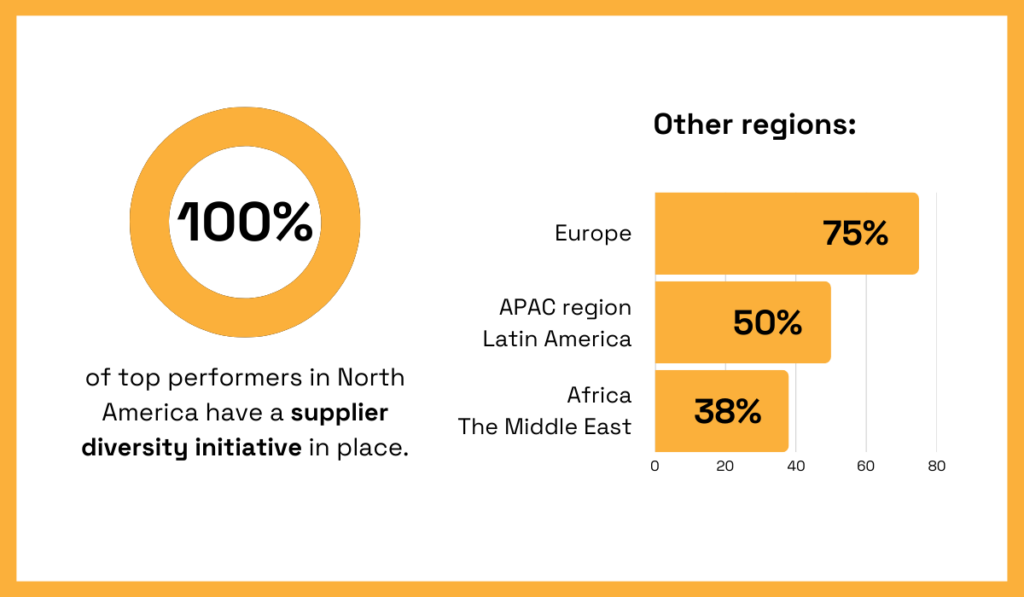
Illustration: Veridion / Data: The Hackett Group
North American top ESG performers are particularly geared toward supplier diversity initiatives, followed by European (75%), Latin America and APAC (50%), and finally, the Middle East and Africa (38%).
Why is the integration between ESG and supplier diversity so important?
Unlike vague commitments or one-off campaigns, supplier diversity requires you to:
In short, supplier diversity is measurable, auditable, and trackable.
The resulting data trail is rewarded by multiple ESG frameworks, including:
| GRI 204 (Global Reporting Initiative) | Requires disclosure on local supplier spend and encourages reporting on inclusion. |
| SASB | Features supplier social assessments for sectors with complex supply chains. |
| B Corp Certification | Assesses companies on DEI, local economic impact, and supply chain ethics. |
With supplier diversity initiatives embedded in overall ESG efforts, high ratings are quick to follow.
One such example is Schneider Electric, which has been topping the charts of external ESG ratings for over a decade.

Source: PR News Global
Before we examine this further, it should be noted that some critics question whether ESG scores accurately reflect company practices.
Namely, a recent study found that the more data a company discloses, the more likely rating agencies are to differ in their assessments.
In other words, a company with limited ESG reporting could, paradoxically, score higher than one with robust programs and transparency.
But this isn’t the case with Schneider Electric.
According to S&P Global’s rating, the company maintains high data availability and still ranks as a top performer in the Social dimension.

Source: S & P Global
This strong performance is based on several key elements, from a comprehensive DEI policy to a mature supplier diversity program.
Notably, Schneider Electric also ensures full transparency by clearly outlining how suppliers can engage with the company, from details on the supplier review process to the accepted diversity certifications showcased below.
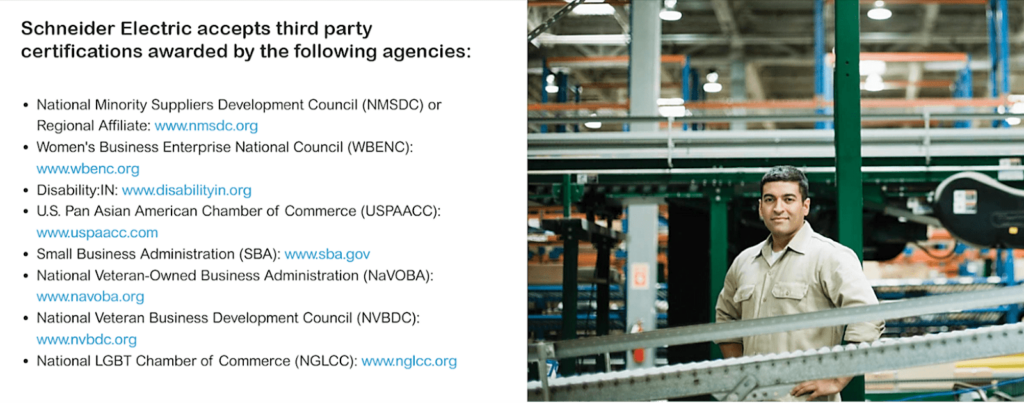
Source: Schneider Electric
Together, these efforts demonstrate how supplier diversity can meaningfully influence ESG leadership in practice and lead to measurable outcomes.
Supplier diversity is pivotal in enhancing ESG strategies by advancing broader diversity, equity, and inclusion (DEI) goals.
Put simply, it’s more than just a metric.
Investing in supplier diversity is a tangible way for companies to turn DEI values into action.
But given the current political climate surrounding DEI programs, you’d be right to wonder how compelling it is to integrate the two today.
Yet, the data tells a more optimistic story.
According to Littler’s research, nearly half of C-suite leaders won’t be considering further cuts to inclusion, equity, and diversity programs despite ongoing debates and pushback.
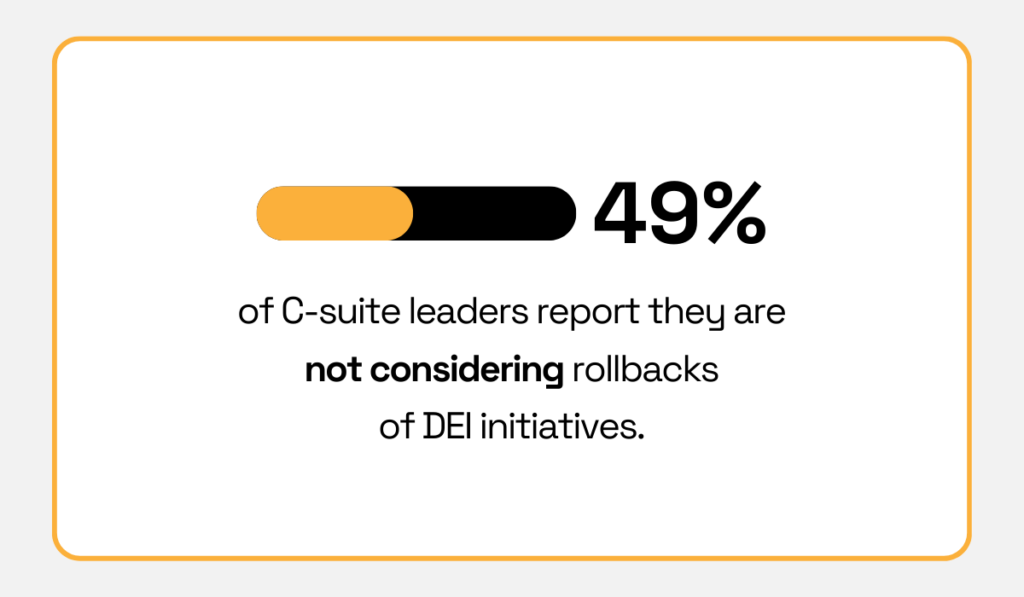
Illustration: Veridion / Data: Littler
That’s partly because consumer expectations and employee sentiment continue to push companies to stay the course.
In fact, one in five LGBTQ+ employees say they would consider leaving their job if their company scaled back DEI initiatives.
While the outlook looks positive enough, the situation remains complex.
Littler’s Jeanine Conley Daves explains that procurement leaders must now balance DEI impact with legal and reputational risks, making it more important than ever to find effective strategies.
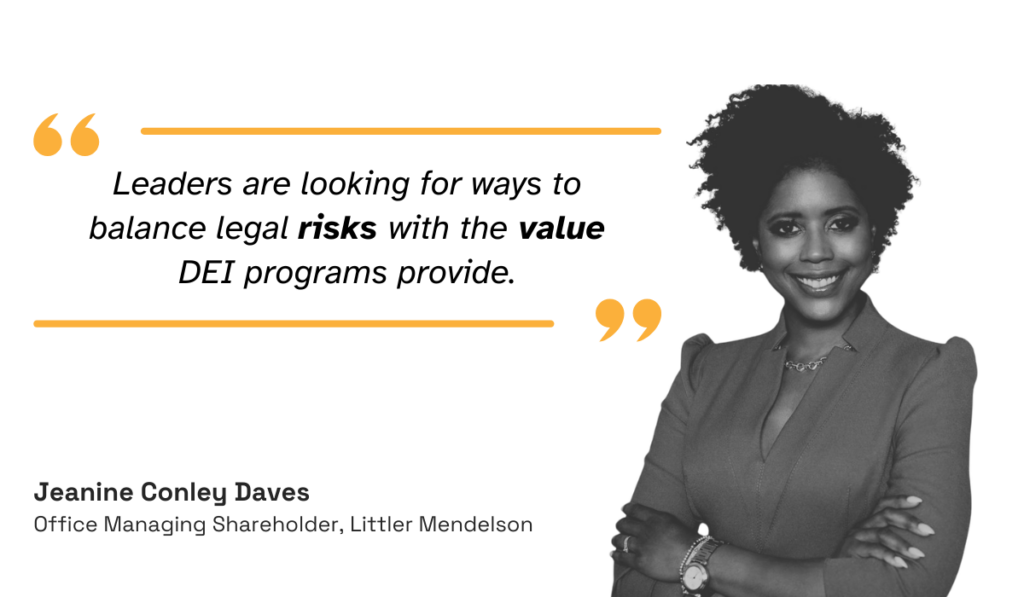
Illustration: Veridion / Quote: Littler
One of the most practical and measurable approaches is supplier diversity.
Take multinational cosmetics manufacturer Estée Lauder Companies (ELC) as an example.
With supplier diversity embedded in its operations for over two decades and ambitions toward multinational ESG leadership, ELC’s commitment is undoubtedly strategic and long-term.
Their DEI strategy is deeply rooted in their Supplier Diversity program, which is built on four pillars:
Thanks to this structure, ELC has already doubled its spend with Black-owned businesses in just three years and surpassed its initial goal of spending $150 million with women-owned businesses by 2025.
Beth Morgan, founder of the boom! platform for female supply chain professionals, notes that the company is a clear industry leader in supporting women-owned businesses.
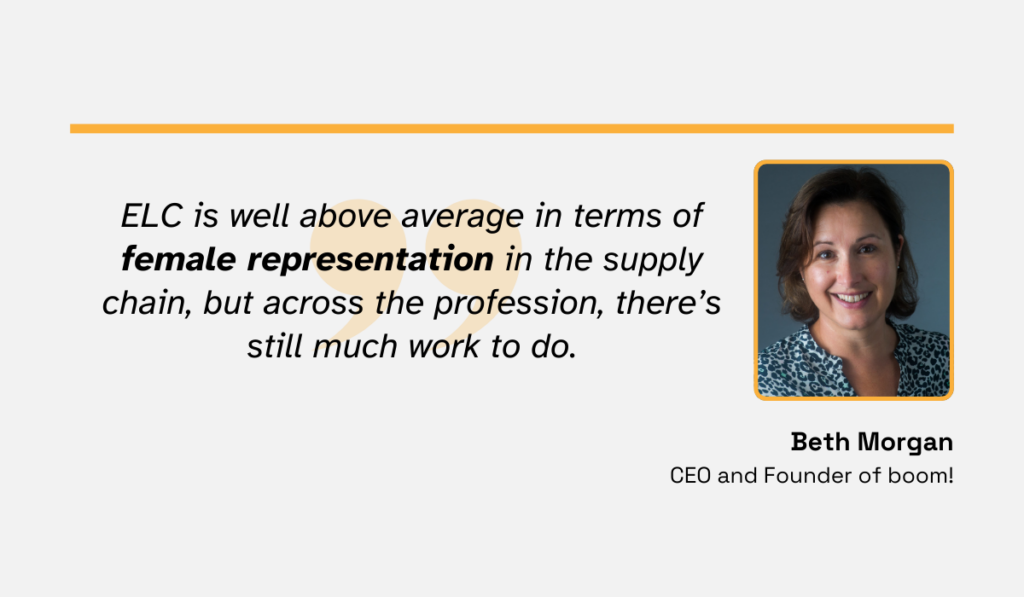
Illustration: Veridion / Quote: Vogue Business
In an environment where there’s still much work to be done and DEI programs face mounting challenges, supplier diversity stands out as one of the most strategic and resilient ways to drive measurable ESG impact.
Diverse suppliers fuel innovation across the supply chain with fresh thinking, agility, and niche capabilities.
By fostering supplier ecosystems that bring in diverse perspectives, companies can promote greater equity and transparency while unlocking new ideas.
Jaggaer’s research shows that 46% of organizations identify supplier innovation as the most significant advantage of supplier diversity programs.
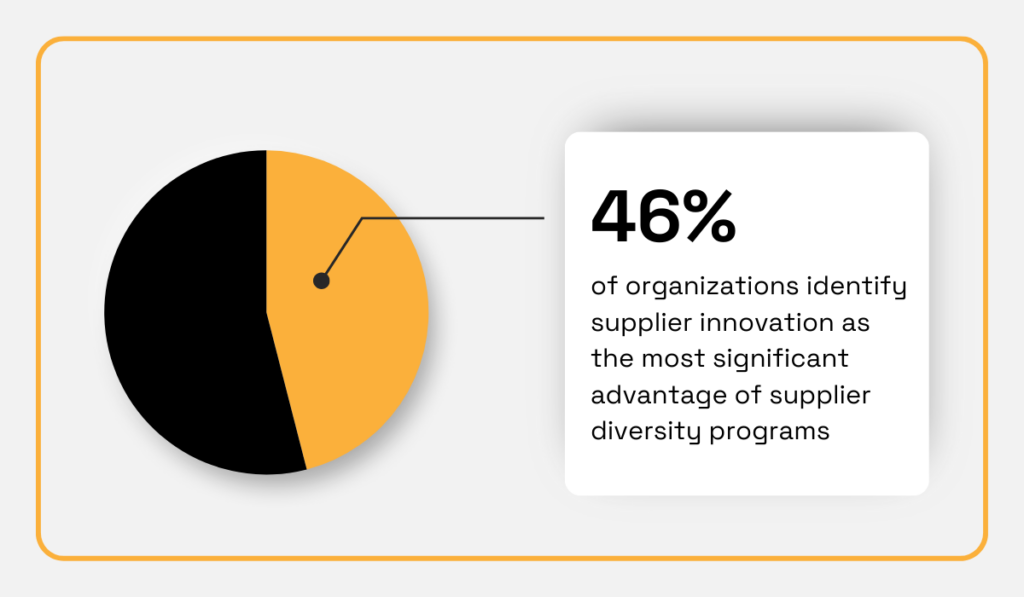
Illustration: Veridion / Data: JAGGAER
European organizations, in particular, see innovation as the most important advantage, with the figure jumping to 56%.
And for good reason.
Innovation doesn’t just improve products; it also supports long-term ESG goals, especially within the Social and Governance pillars.
Procter & Gamble is a standout example of how strategic supplier diversity can yield concrete returns.
By investing in relationships with a wide range of suppliers—minorities, women, veterans, and LGBTQ+ owners—P&G achieved a multibillion-dollar spend aligned with its ESG priorities.
But this impact wouldn’t be possible without the contributions of entrepreneurs like Carl Satterwhite, who call for creating spaces where different ideas can be heard.
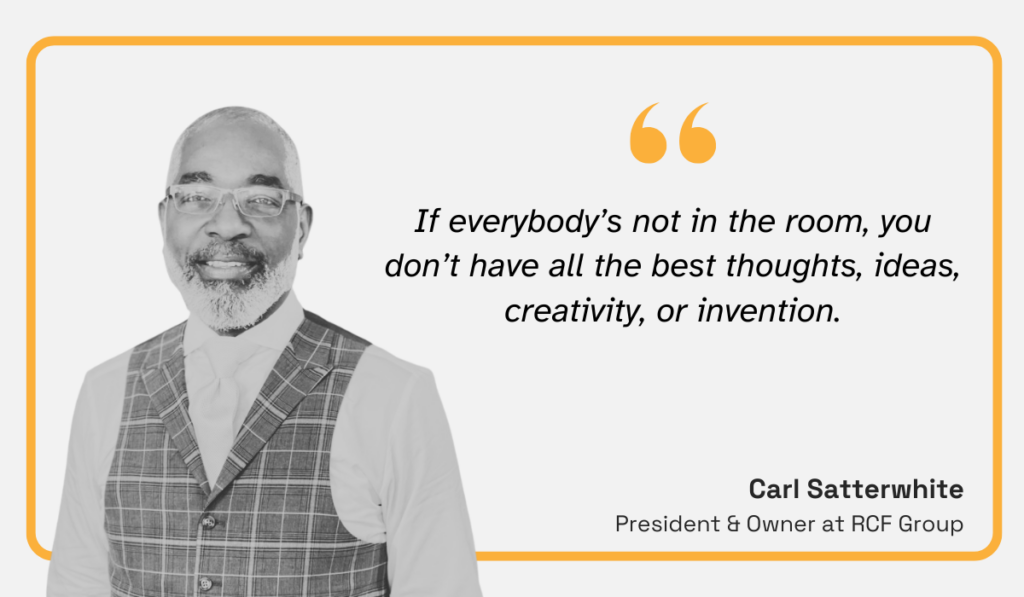
Illustration: Veridion / Quote: P&G on Youtube
In 2002, P&G brought together minority- and majority-owned suppliers to encourage joint ventures that could scale and drive innovation.
The goal: Advance broader ESG commitments, including maintaining $1 billion in annual diverse supplier spend as part of the Billion Dollar Roundtable.
Satterwhite’s RCF Group, formed through this initiative, now designs and furnishes workspaces for P&G and other Fortune 50 companies.
For them, staying competitive meant staying agile and sticking to core values that continue to define RCF’s success years later:
Source: P&G on Youtube
Since its founding, the company has been designing, furnishing, and managing workspaces for P&G and multiple Fortune 50 companies.
But staying on top required RCF to be more agile and more imaginative than the competition, which is why the company continued to cultivate thinking outside the box and support diverse businesses.
In the end, it’s a ripple effect: Companies like P&G that embed DEI into their supplier strategy enable diverse businesses to innovate, scale, and thrive.
This philosophy is echoed by Shelly McNamara, P&G’s longtime Chief Equality & Inclusion Officer.
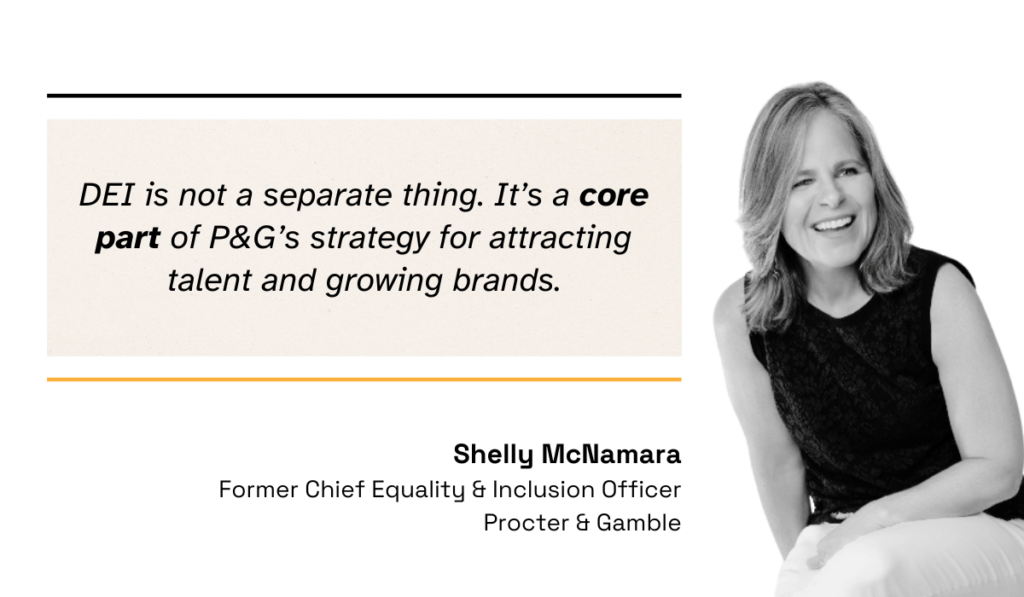
Illustration: Veridion / Quote: Handshake on YouTube
McNamara emphasizes that unconscious filters can block critical insights into consumer needs, limiting both product relevance and ESG progress.
In the end, business practices should mirror and uplift the communities they serve because innovation thrives when inclusion is built into the supply chain by design.
Integrating small and diverse suppliers helps organizations weather disruptions more effectively, whether they’re caused by geopolitical conflict, natural disasters, or economic shifts.
By moving away from traditional vendors and enriching your supplier network, you can minimize a wide range of procurement risks while unlocking additional benefits.
Diverse suppliers are often overlooked in legacy procurement systems, and due to fewer opportunities, many of them are exceptionally agile and deeply committed.
Plus, their localized knowledge and ability to adapt give them a unique edge during supply chain disruptions.
With all this considered, it’s no wonder that The Hackett Group’s 2016 survey of supplier performance showed that the overwhelming majority of diverse suppliers either meet or exceed expectations.
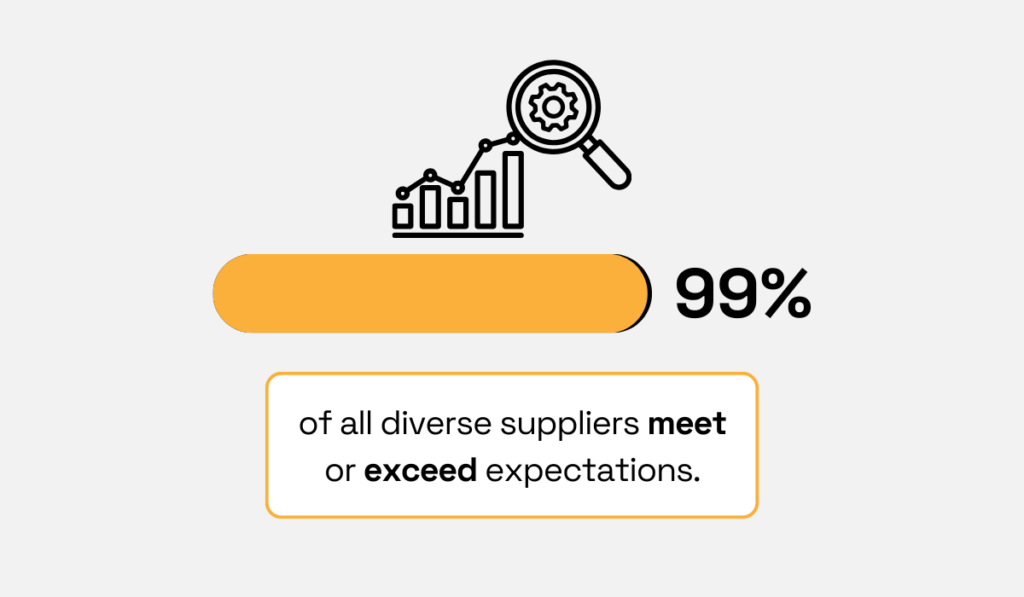
Illustration: Veridion / Data: The Hackett Group
These findings challenge the myth that pursuing diversity means sacrificing quality.
On the contrary, inclusive sourcing strategies boost both resilience and agility while delivering measurable savings.
McKinsey reports that Minority/Women-Owned Business Enterprises (MWBEs) can generate year-over-year cost reductions of up to 8.5% for their corporate clients.
However, unlocking these benefits still rests on conducting thorough supplier diversity assessments, which come with challenges of their own.
One is access to supplier data.
Research shows that supplier diversity data is highly volatile, changing about 23% each year due to expired certificates, ownership changes, or other developments.
As pointed out by the former CMO of HICX, Anthony Payne, this creates both sourcing and compliance challenges.
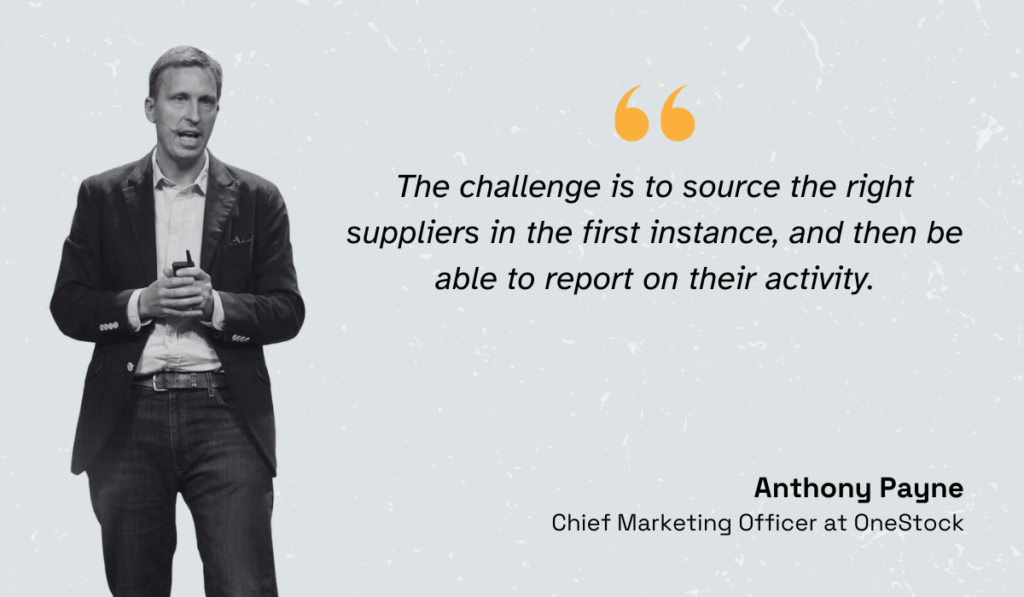
Illustration: Veridion / Quote: CPO Strategy
So, what’s the solution then?
While supplier relationship platforms like HICX help companies streamline data management, ESG-focused data providers like Veridion take it a step further.
Veridion offers AI-powered supplier discovery backed by global ESG data coverage and weekly updates, as well as advanced filtering capabilities.
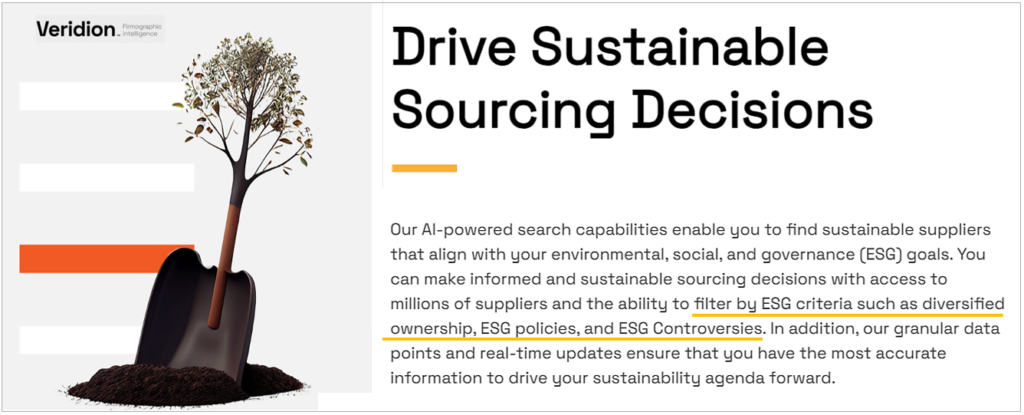
Source: Veridion
This allows companies to avoid ESG controversies by continuously monitoring suppliers across key metrics such as:
Nevertheless, the challenges begin during supplier discovery, so let’s take a look at how our Scout tool can help you navigate through them.
Thanks to the natural language search features, you can simply type your query directly, making it as specific as you need it to be.
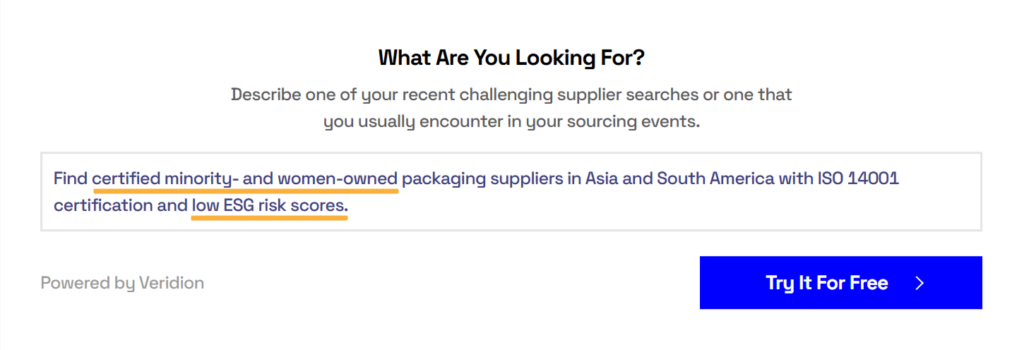
Source: Veridion
The results? 1,246 companies that perfectly match your requirements.
Scout’s preview alone reveals geographic distribution, industry focus, and product-level details—all in seconds.
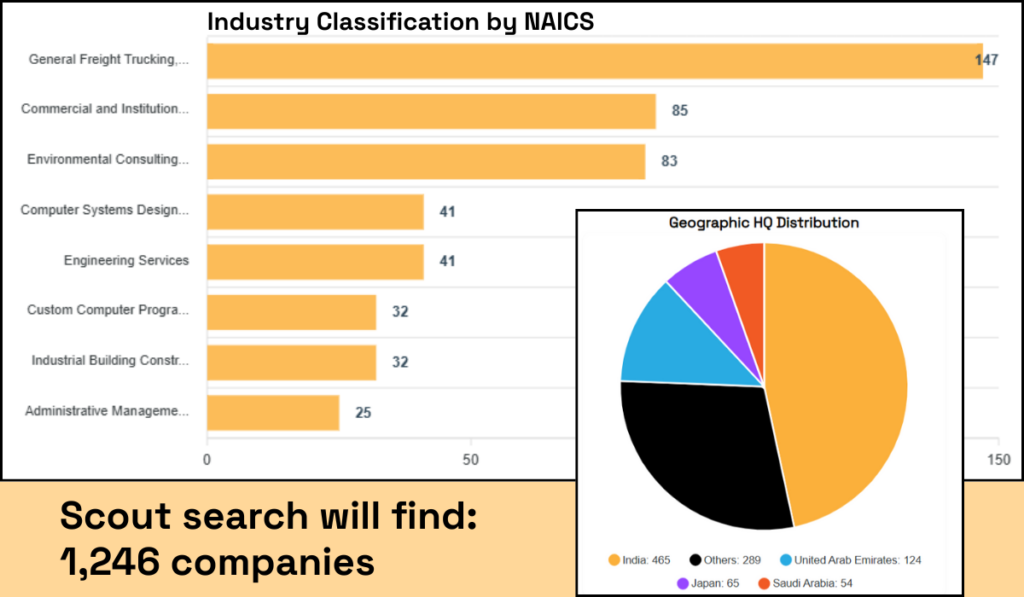
Source: Veridion
Overall, supplier diversity is a strategic tool for reducing risk, and with the right data and technology in place, companies can future-proof their supply chains while advancing ESG goals.
Investors, customers, and other external stakeholders increasingly expect companies to implement robust ESG programs.
Focusing on supplier diversity is a surefire way of delivering just that, in no small part thanks to the reputational boost it provides.
To go back to Jaggaer’s findings, the most commonly cited benefit of supplier diversity is positive reputational impact, with over half of organizations identifying it as a top outcome.
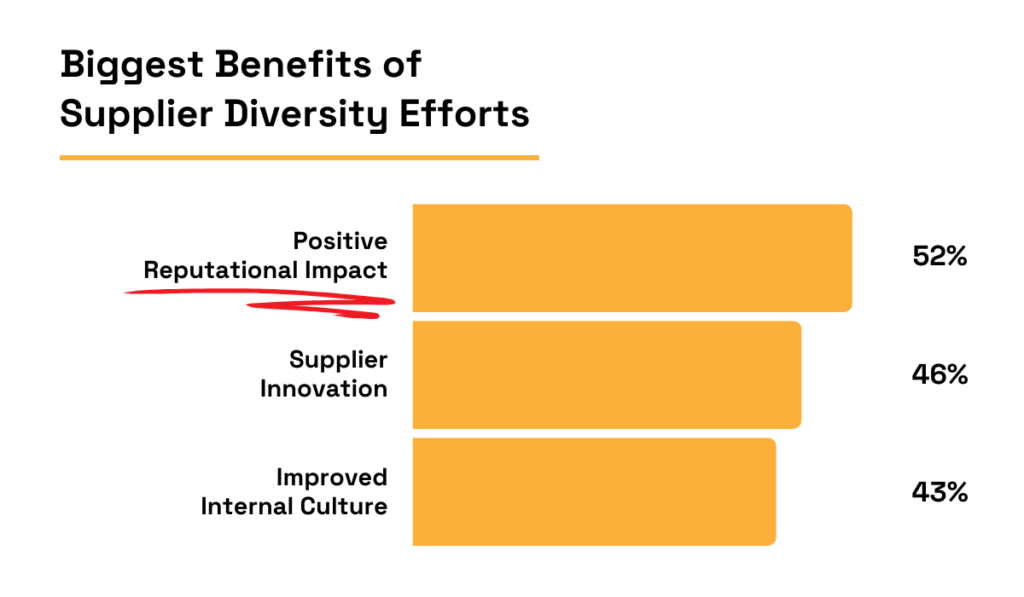
Illustration: Veridion / Data: JAGGAER
In North America, that figure jumps to 66%, reflecting especially strong stakeholder interest in ethical and inclusive business practices that foster long-term trust and credibility.
Experienced supply chain manager and ISM’s expert Jim Fleming explains that focusing on corporate social responsibility throughout the supplier lifecycle is non-negotiable today.
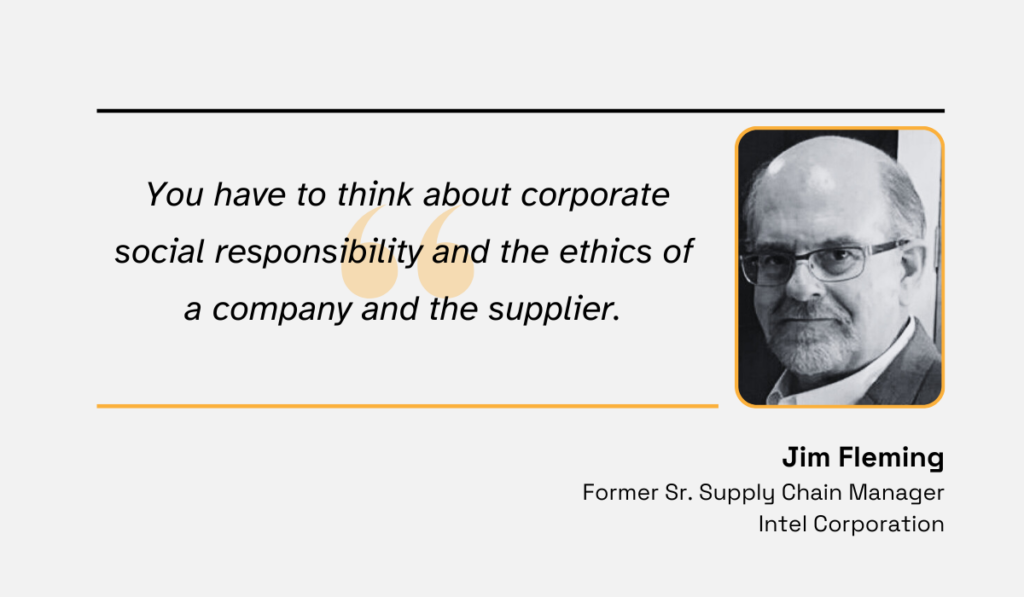
Illustration: Veridion / Quote: ISM
One of the main reasons why is because customers and stakeholders are increasingly aware of these issues, which means that companies that fail to reflect these values risk serious reputational damage.
That growing demand for transparency and inclusion is reshaping procurement strategies, with many companies already prioritizing supplier diversity as part of their ESG efforts.
For instance, Unilever publicly tracks diverse supplier engagement to ensure equity across its value chain.
Moreover, the company’s commitment to spend €2 billion annually with diverse businesses is closely tied to its ESG goals, as explained in the video.
Source: Unilever on YouTube
Keep in mind that even brands that don’t highlight supplier diversity as explicitly as Unilever end up building inclusive supply networks as part of broader stakeholder alignment.
Take illycaffè, an Italian coffee giant that has consistently ranked high in ESG indexes, thanks to its stakeholder-first approach.
The company focuses on creating value throughout their supply chain in line with their recently revised stakeholder framework showcased below.

Source: illy
This includes actively aligning with stakeholder expectations by demonstrating meaningful progress across social, environmental, and economic priorities.
In recent years, illycaffè has taken concrete steps in this direction, such as:
They also became the first Italian coffee company to receive—and continuously renew—previously mentioned B Corp certification, thereby committing to high standards of social and environmental performance.
Illy’s direction aligns with the broader trend of building inclusive supply chains as part of a holistic ESG strategy.
Whether companies spotlight supplier diversity or not, it’s clear that the increasing reputational and regulatory pressures are moving them closer to it.
There you have it.
Supplier diversity remains one of the strongest signals of authentic ESG commitment.
The best part?
Partnering with underrepresented suppliers is sure to boost your ESG scores and DEI progress, but making it a core part of your ESG efforts builds supply chain resilience.
Unlike vague pledges, these programs deliver a measurable impact that frameworks, investors, and stakeholders recognize and reward.
They also unlock agility and innovation through stronger, more inclusive partnerships.
As global ESG standards continue to evolve, procurement leaders must turn diversity from an afterthought into a strategic edge.
If you haven’t started yet, consider this your call to action.